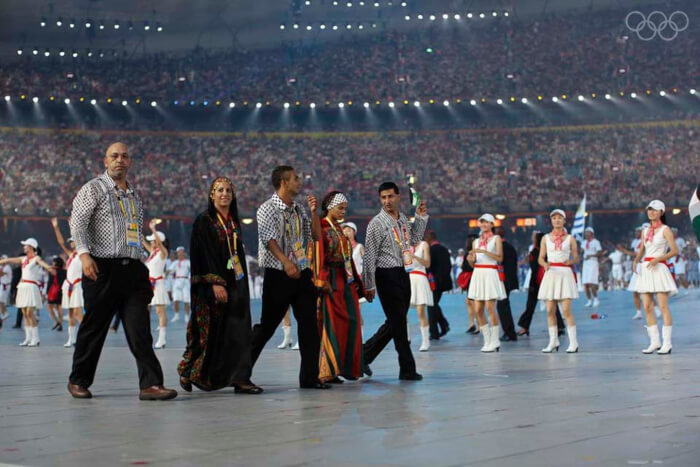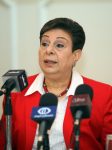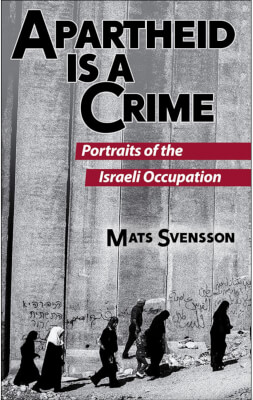The Arab World first entered athletes in the Olympics in 1912 and the number of Arabs competing in the Summer Olympics and the Winter Olympics continues to increase. But political hurdles by the West and Israel have continued to undermine fair competition and one country in particular has been the target, Palestine.
By Ray Hanania
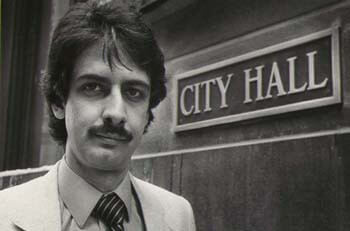
covering Chicago
City Hall
(1976-1992)
Sadly, politics drives the Olympics as much as athletic ability and most of the countries participating in the Olympics are oppressive regimes not just in the 3rd world but in Europe and the West, too.
Athletes are selected, even in the United States, based on political considerations above talent. Popularity and political ties can fuel the entry of one athlete above the more talented athletic competitors in many countries, including in the United States.
The Arab World continues to have athletes in the Olympics, presenting a positive face to an area that is constantly disparaged and attacked because of anti-Arab and anti-Muslim political considerations, mainly from Western nations.
The more the issue involves criticism of Israel, the more the story is suppressed, killed or water down to minimize its exposure to the public. As long as criticism of Israel is not in the mix, stories about Arab World athletes receive coverage and distribution in the racist West.
Israel, which is in the heart of the Middle East Levant, is treated differently than the Arab countries, which is ironic. For example, Israel is often listed in the category of “Europe” when listing participating nations while the Arab countries are listed in designations under either Africa or Asia.
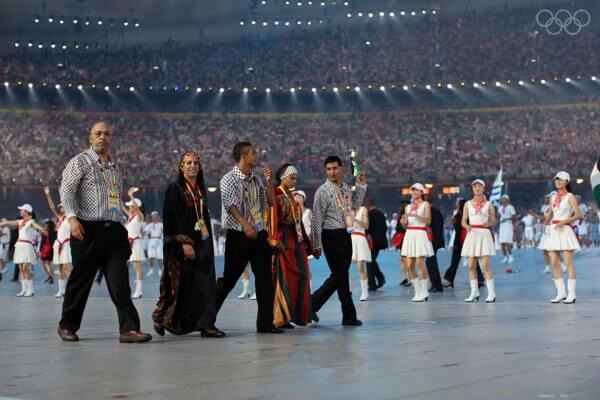
In fact, Israel is officially listed as being a member of the European Olympic Committees which is based in Rome, Italy. Arab countries are listed as members in the two African and Asian Olympic committees, the Association of National Olympic Committees of Africa and the Olympic Council of Asia.
God forbid that a journalist might make the mistake and include “Arab” in anything that has to do with Europe or the West.
The Arab countries that are participating in the Olympics are: in the African Group, Algeria, Egypt, Libya, Morocco, and Tunisia; In the Asian Group, Bahrain, Iraq, Jordan, Kuwait, Lebanon, Oman, Palestine, Syria, United Arab Emirates and Yemen.
The Arab presence at the Olympics, which is divided into two competitions, the Summer Olympics and the Winter Olympics, first began in 1912 with athletes representing Egypt. The two are held separately two years apart, and each is held every four years. The Arab countries enter more athletes in the Summer Olympics than in the Winter Olympics, mainly for geographic reasons, of course.
Of the 88 nations participating in the Sochi Olympics in 2014 in Russia, only four Arab athletes were in competition from two Arab countries, Egypt and Lebanon.
For more information on Arab participation in 2012 London Summer Olympics (representing the 100th Anniversary of Arab participation in the Olympics), click here.
For more information on Arab participation in 2014 Sochi Winter Olympics, click here.
Athletes from the two Arab countries and also Israel and Turkey failed to win any medals in the 2014 Winter Olympics.
Generally, the Arab World and Levant region does better in the summer Olympics, for obvious climate reasons.
This year, the Summer Olympics includes a strong presence from the Arab World including from Palestine, which operates under the brutal oppression of Israel’s military dictatorship and racist anti-Christian and anti-Muslim policies.
Team Palestine 2016 consists of 6 athletes, although Israel has done everything it can to undermine the Palestinian athletes from blocking the delivery of training equipment from entering both Gaza and the West Bank, to denying Palestinian athletes the necessary visas to travel to Rio for the Summer 2016 Olympic Games. They first entered athletes in the Olympics in the summer games in 1996.
To review a history of Israeli racism against Palestinian athletes, click here.
The Israeli media has downplayed and even disparaged the Palestinian team and rarely writes about Israel’s abuses and civil rights violations against non-Jews and Palestinians. The list of incidents is astounding.
The Times of Israel recently wrote a typically ugly story claiming most of the Palestinian contenders were not Palestinian, for example. What the Time of Israel writer did was twist the fact that some of the Palestinian contenders do not have citizenship in the occupied territories and live in other countries – blocked from returning to their homes by Israel’s racist laws that discriminate between Jews and non-Jews. Ironically, many Israeli athletes also fall in the same category and represent Israel even though they have dual citizenship from other countries, too.
The Times of Israel writer openly expressed his hostility towards the Palestinians (some might call it racist hatred) when he noted that no Palestinian has ever stood on the medal platform adding, “It would be a major upset were that to change in Rio.”
A “major upset” indeed for an oppressive, selfish country. It was the same racist view expressed by Apartheid South African writers in the 1970s and 1980s about Blacks.
Of course, the Arab World media has not been much better. The Arab World media generally focuses only on the political aspects of the Olympics and only writes about Arab competition when they can bash Israel and when they can challenge issues of religious immodesty, arguing that female Arab Olympians should be prevented from competing because of the “immodest” clothing worn such as swimsuits and tight spandex-like track clothing.
In addition to the six athletes, (two swimmers, two track and field athletes, a judo player and one equestrian competitor), the Palestinian Olympic team also includes 16 coaches and administrators.
The Israelis have so far blocked Issam Qishta, the leader of the team, from attending the Olympics as a part of its discriminatory policies against non-Jews living in Israel and under occupation.
Wikipedia provides a better overall coverage of the Palestinian team, writing in this overview:
According to Nabil Mabrouk, president of the Palestinian Track and Field Federation, the Palestine Olympic Committee was first founded in 1969.
The Palestine Olympic Committee was accepted into the Olympic Council of Asia as a provisional member in 1986. The decision was protested by Israel, who was refused membership to the same committee in 1982. The decision allowed for the Palestine Olympic Committee to participate in the Asian Games. Yasser Arafat, the leader of the Palestine Liberation Organization, was also the head of the Palestine Olympic Committee in these early days.
The Palestinian Authority was first represented at the International Olympic Games at the 1996 Summer Olympics.
Akram Zaher, the Manager of International Relations for the Palestine Olympic Committee, also served as a Board Member and the Environment & Sports Committee Chairman of the West Asian Games Federation. He was killed in an explosion in a Palestinian refugee camp in Lebanon on March 24, 2009.
Jibril Rajoub served as president of the Palestine Olympic Committee and as president of the Palestine Football Associationbefore being elected to the Fatah Central Committee in August 2009. Rajoub had also served as a security official under Yasser Arafat and spent time in Israeli prison for attacking Israeli military vehicles. In a letter to the IOC on July 27, 2012, Rajoub praised their decision to not honor the 11 murdered Israeli athletes at the 1972 Munich Games.
Samar Araj Mousa is a member of the Palestine Olympic Committee and also serves as the Athletics Director at Bethlehem University, the manager of the Palestinian Women’s National Soccer Team, and the general secretary of the Palestinian Tennis Association.
Click here for a list of National Olympic Committees.
Palestine gets support from Samsung Corporation, a major sponsor of the 2016 Olympics, through the program “Generations for Peace.”
Olympic TOP Partner Samsung Electronics and Generations For Peace have renewed their partnership for the ninth consecutive year. Samsung’s support helps Generations For Peace programmes to expand in Jordan, Palestine, Lebanon and Iraq, and forms part of Samsung’s corporate social responsibility programme and commitment to supporting education and health. More info on www.generationsforpeace.org.
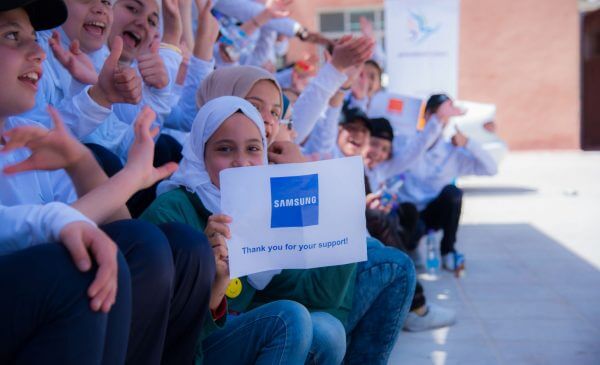
Generations for Peace issued this press release about their expanding program in Jordan:
United Nations Children’s Fund (UNICEF) and Generations For Peace today announced a new partnership that will scale-up the Generations For Peace Jordan Schools Programme and benefit 4,920 female and male students and teachers in Jordanian host communities in Ajloun, Amman, Irbid, Karak, Mafraq and Zarqa.
Using innovative sport and arts-based activities, the programme unlocks creativity and nurtures new capacities and relationships amongst the teachers and students, reducing serious levels of violence in schools experiencing increased population pressures and tensions due to the high influx of Syrian refugees. This month, Generations For Peace is conducting specialised trainings for 120 teachers who will then lead a series of 48 sessions of special Sport and Arts For Peace behavioural change activities with students throughout the school year.
UNICEF’s support enables the programme to double in scale from 12 to 24 schools, selected in the most vulnerable host communities, in partnership with the Ministry of Education. Evaluations from the programme over the last three years show improved relationships between teachers and students, and between the students themselves, including Jordanian and Syrian students. This has led to improvements in academic performance and a significant reduction in violence: a decrease of 80% of female and 52% of male students who report responding to conflict with other students, teachers or at home with physical violence.
Mr Robert Jenkins, UNICEF Country Representative for Jordan, said: “UNICEF is delighted to support Generations For Peace to scale-up its work in schools, in parallel with our existing partnership in community centres and youth centres. The growth of our partnership demonstrates a commitment to improving social cohesion among Jordanian and Syrian refugee children and youth in host communities.” Robert added: “We have witnessed the positive impact and growth of this programme over the past three years, and this new partnership together enables us to extend its reach to benefit more teachers and more students in the most vulnerable communities.”
HE Dr Mohammad Thneibat, Minister of Education, said: “UNICEF’s support enables us to build on the programme’s successes and the excellent collaboration between Generations For Peace and the Ministry of Education at local school level, Directorate level, and national level. With the support of UNICEF, the programme will engage more schools and teachers to ensure a greater number of students can benefit from quality education in a safe and productive learning environment.”
HRH Prince Feisal Al Hussein, Founder and Chairman of Generations For Peace, said: “Generations For Peace is proud to be partnering with UNICEF to benefit more children and youth in vulnerable host communities. Through this partnership, and with the generous support also of the Jordan Olympic Committee, the Belgium Ministry of Foreign Affairs, Samsung, Orange and DHL, we are expanding our efforts to reduce violence inside and outside of the classroom, and improve educational performance in more schools throughout Jordan.”
The programme has been expanding steadily since it began as a pilot in 2013 with support from US Department of State, and then support from USAID over the last two years.
Related articles


- Israelisnipers shooting and killing hospital workers in Gaza - December 11, 2023
- CAIR Condemns Israeli Executions of Wounded, Unarmed Palestinian in West Bank - December 11, 2023
- Arab and Muslim American voters face a “simple choice” between Biden’s inhumanity and Trump’s edgy politics - December 9, 2023













